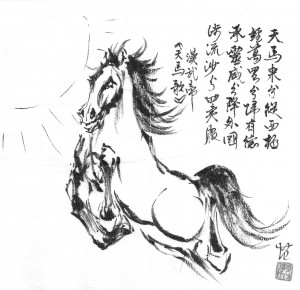Incredibly enough, it’s now nearly ten years since SARS became an international crisis and turned much of China inside out. SARS affected my impressions of China more than any other issue and shaped the tone of this blog for years. Below are my recollections of this turbulent time.
Life and Death in Beijing in the Age of SARS
It was the winter of 2002 and I was having a difficult time in Beijing. I was wondering whether I wanted to live there at all. On my first night in my new apartment I lay down on the bed and it collapsed onto the floor with a crash. As it got colder my central heating only worked about half the time. Sometimes I slept in an overcoat. I had to send part of my salary back to the US to pay for my mortgage and soon learned the bank simply wouldn’t let me. The government wanted to keep all the renminbi in China. And I wasn’t quite prepared for the culture shock of rampant line-cutting, drivers who saw pedestrians as moving targets, questionable sanitation practices and worse.
I was eventually going to be enthralled with Beijing, but in the winter of 2002 all I felt was frustration, intensified by weather so brutally cold I could barely step outside. Everything was going wrong. Just when I thought things couldn’t get any worse, my blog suddenly became inaccessible (along with all other Blogspot blogs; I could get in the back end to post, but I couldn’t see the blog.) I had started it several months earlier in Hong Kong and it had become an important part of my life, my one creative outlet. January marked the month that my blog posts became increasingly political. I was fed up with the censorship, the idiotically cheerful spin all stories received in the state-controlled media, the government’s obvious prevarications, the blatant propaganda that was always on the television. I let it all out on my blog. And now I couldn’t open it.
The day I first read about a strange new disease afflicting southern China there was record cold, and the wind sliced across my face as I walked from my apartment to the subway to work. It was mid-February of 2003. I had just taken off my heavy lambs-wool coat and turned on my PC when the story flashed across my screen: an unidentified disease was infecting people in Guangdong province. It was a respiratory infection and health workers had no idea what it was. More than 200 had been infected and five had died. It was a lead item on Yahoo News and there wasn’t much more information except that Chinese government officials were saying very little about it. No surprise there.
Southern China has long had a reputation of being a breadbasket for new diseases, in particular different strains of flu. As news of the infection spread over the weeks to come, some would hypothesize it was caused by people living in close proximity to animals. At Guangzhou’s notorious animal markets wild game and dogs and pigs are jammed into cages adjacent to one another. I had seen a news report about these markets and wondered how people could work amid such squalor. The report, on CNN, showed a young boy, maybe nine years old, wearing shorts and flip-flops, squatting in the slime that covered the floor. Who knew what kind of virus might mutate and spread from one animal to another, and finally to the men working the cages or to shoppers? No matter how it started, it appeared that once again the region had spawned an insidious new pathogen.
The story on my screen said the illness had started infecting people in November of 2002, and immediately I felt my blood pressure rise a notch. Nearly four months, and only now were we hearing of a potentially lethal situation. People’s lives were at stake and the government had been sitting on its hands. It brought up all my issues with how the Communist party operated, of how China’s leaders’ obsession with harmony trumped its concerns for its own people. Bad news was automatically repressed. The government always had to look good. (more…)


Comments